A Dietitian’s Guide To Eating More Sustainably

A Dietitian’s Guide To Eating More Sustainably
Apr 22, 2022 | By JOI team
Are you trying to do better for the planet? Learn how you can eat more sustainably and reduce your environmental footprint with JOI’s in-house dietitian.
Why "Eat" to Be More Earth Conscious?
Here at JOI, sustainability is our jam. We care for the health of the planet the same way we care for the health of our customers. As a company, we are always trying to find new ways to reduce our environmental footprint in all aspects of our supply chain. But what can you, as an individual, do in order to reduce your negative impact on the planet?
One way is to reduce your carbon footprint. Your carbon footprint is the amount of greenhouse gas you generate each day, and it includes the foods you eat. In fact, food production has a large impact on the environment. It accounts for 24% of the total greenhouse gas emissions, while transportation accounts for only 14%. Because the current structure of our food system poses a threat to the environment, making changes to your diet is crucial for helping Mother Earth.

6 Tips to Eating Your Way to Sustainability
Here are six (6) ways to eat a more sustainable diet:
1. Eat more plants
Plant-based foods – fruits, vegetables, whole grains, legumes, nuts and seeds – are much more sustainable to produce than animal products. Research indicates that greenhouse gas emissions from animal-based foods are twice those of plant-based foods.
Incorporating more plant foods into your diet is easy! Just swap cow’s milk for JOI, add fresh fruits to your breakfast, make vegetables a part of your meals and snack on nuts and seeds.
2. Reduce meat consumption
This is perhaps the most impactful way to lower your carbon footprint. That’s because animal agriculture alone generates nearly 15% of all man-made greenhouse gas emissions.
Meat production, especially red meat, requires an enormous amount of natural resources such as land, water, crops and energy. Livestock production – which includes meat, milk and eggs – uses one-third of the world’s water supply. Opt for more eco-friendly proteins such as beans, lentils, chickpeas, tofu and tempeh.
3. Shop local
Choosing locally-grown foods is a great way to reduce your carbon footprint! That’s because they aren’t as heavily dependent on resources such as transportation and packaging, both of which have a negative impact on the environment.
Shop at your local farmers market, choose food items labeled as ‘local’ at the grocery store, or even better, grow your own foods at home, such as fruits, vegetables and herbs.
4. Buy foods in-season
When possible, add in-season fruits and vegetables to your grocery bag. Seasonal produce usually travels shorter distances to grocery stores, and therefore requires less energy and fuel.
Besides being better for the planet, seasonal produce is often more nutritious, affordable and tastier! Refer to online seasonal food guides to help you choose in-season produce in your area.
5. Be mindful of food waste
Here’s a horrifying statistic: 30-40% of the food produced in the U.S. is wasted. This can have serious repercussions on the environment because food waste goes to landfills, contributing to air, water and land pollution.
Here are simple ways to reduce food waste: freeze leftovers before they spoil, use vegetable scraps such as carrot peels and onion skins to make vegetable stock, avoid over-shopping for food by planning your weekly meals, use leftover vegetables in soups and stir-fries, turn stale bread into croutons or breadcrumbs, and make smoothies or banana bread with overripe bananas.
And, use JOI - because you an make as much or as little plant milk as you need. No more throwing away half-used cartons of spoiled milk.
6. Ditch the single-use plastic
When it comes to environmental friendliness, plastic is simply not a friend. Plastic takes several years to decompose, plus it releases toxic substances into the soil and the air.
You may have seen compostable and recyclable packaging, but you may not have heard of post-consumer recycled materials. PCR is another more sustainable option, as it's made from other recycled materials, yet just as durable as single-use plastic packaging, making it a great safe option for protecting food. Best of all, PCR packaging is a good move for brands who want to offer a sustainable solution for consumers, with no requirements or actions needed on the consumer end, unlike recyclable and compostable packaging.
Here at JOI, we proudly ditched single-use plastic by switching to a glass container for our plant pastes, landfill-biodegradable stick packs for on-the-go creamers and oat milk, and PCR packaging for our pouches. By choosing JOI, you are reducing roughly 85% of packaging waste with our jars, and up to 96% with our pails!

Let’s Do This.
Living more sustainably involves every aspect of your life; from the transportation you take, to how much you spend on your energy bill. But what you put on your plate is an even more powerful contributor to your environmental footprint. By adopting these small, simple tips, you can make a large, positive impact. Beyond environmental concerns, the current food systems promote non-nutritious, unhealthy food choices. Eating a more sustainable diet is not only beneficial for the Earth, but also beneficial for your health.





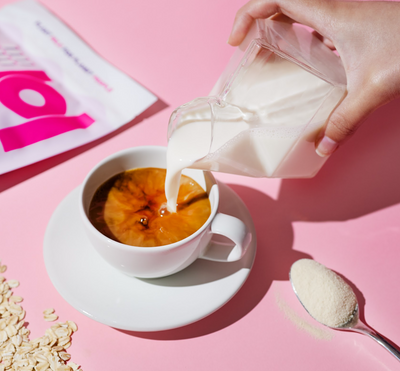
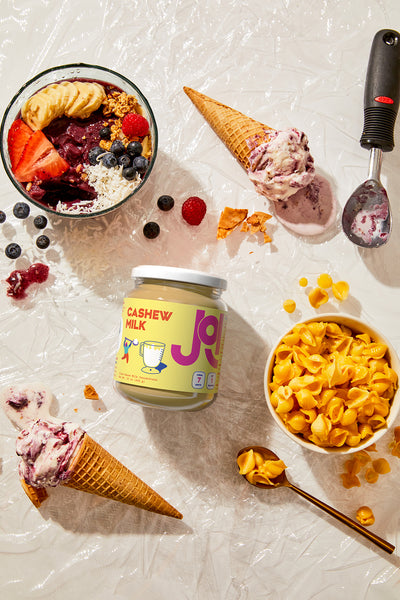
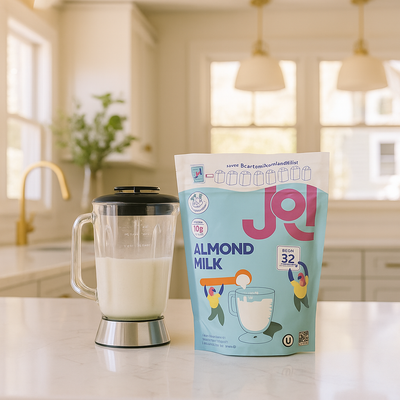
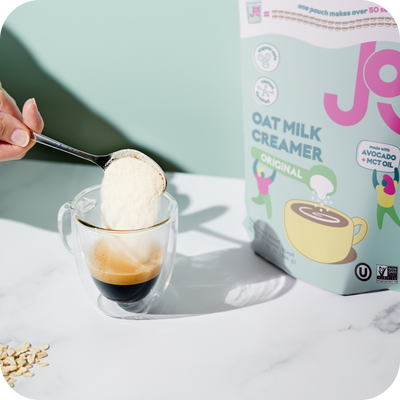
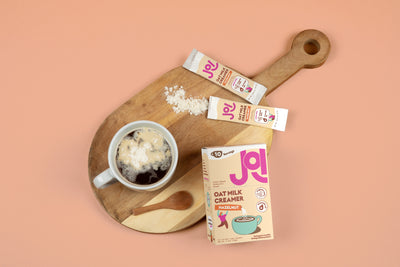
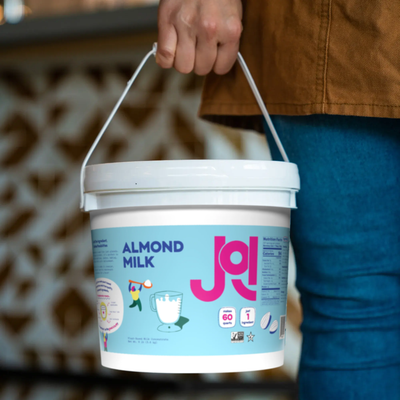
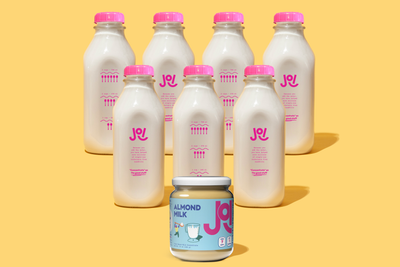

 CHECKOUT
CHECKOUT